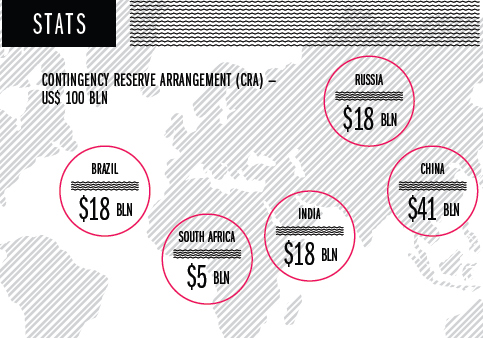
On July 15th leaders of the BRICS nations have agreed to establish a New Development Bank (NDB) while attending the group summit in Fortaleza, Brazil. This announcement has cause extraordinary attention all around the world, marking the undeniable significance for the future development of the BRICS, as well as the entire foundation of the international financial institutions. Naturally the NDB creation initiative has prompted optimistic feedback as well as raised questions and skepticism. WEJ has invited two renowned experts to explain the meaning of the BRICS New Development Bank announcement and attempt to predict what this initiative might bring to the global financial and economic development.
Ambassador Viswanathan, Head of Indian Delegation to the BRICS Academic Forum and the Think-tank Council
“The establishment of a New Development Bank by BRICS is a very significant initiative on the global scene both economically and politically.
After the Second World War, this is the first time that a major International Institution is created without participation from the so-called West. But the BRICS countries do not see this as an opposition to World Bank. The NDB is envisaged as an alternative and additional source of finance for infra-structure projects for the Developing Countries. It is well known that over the years, the disbursements of World Bank have been going down. Hence, there is urgent need for additional funding. The Bank is a good way of recycling the savings in these emerging economies.
The other major initiative at the Fortaleza Summit is the creation of the Contingency Reserve Arrangement (CRA) of US$ 100 billion. This will help the BRICS and other developing countries in dealing with occasional balance of payments difficulties.
The Bank will operate purely on economic principles. The bottom line is that it has to be commercially viable. The Bank hopes to leverage the authorized Capital to borrow from International financial markets to raise loans for infra-structure projects. The beneficiaries will be the BRICS and other developing countries.
NDB is certainly a new paradigm in Global Economic Governance. While this is not to be looked upon as a rival, it should be seen as a wake-up call to the existing global financial institutions to undertake major reforms for a more inclusive system of management. The discourse on BRICS should not be simplified as "West vs the Rest". The truth is that today the West needs the Rest. A non-confrontational and inclusive approach should inform the efforts to create a new order.”
Jayshree Sengupta, Senior Fellow, Observer Research Foundation
“There is much scepticism regarding establishing the New Development (BRICS) Bank which was agreed upon in the BRICS summit in Brazil recently. It is viewed as a competitor of the Asian Development Bank and a challenger of the twin Bretton Woods Institutions --the IMF-World Bank which have dominated the international financial architecture in the post-World War II years. The New Development Bank will be a viable alternative for the developing countries which are not getting a proper representation in the IMF-World Bank system. Reforms of the IMF quotas and voting rights have been languishing in the US Congress since 2010 which could have corrected the heavy weightage given to the industrialized countries in the IMF.
With the exception of Russia, BRICS is still a forum of developing countries and the interest of the developing world matter to them most specially borrowings for infrastructure development. Hopefully when the bank is in place, there will be fewer delays in credit availability and there would be less conditionality. It will offer a protection to the member countries against global liquidity pressures and will include currency issues where members’ national currencies are being adversely affected by global financial upheavals.
There is fear in some quarters that China with its high contribution to the Contingent Reserve Arrangement which is directly related to its having the highest foreign exchange reserves, would dominate the bank. China will be contributing $41 billion, Russia, Brazil and India $18 billion each and South Africa $5 billion. But this may not be the case despite the headquarters being in Shanghai. There is going to be a democratic approach to governance and each member will get equal voting rights. Regarding the management of the bank the first President will be an Indian, the first Chairman of board of governors will be a Russian and first Chairman of the board of directors will be a Brazilian and the first regional centre of the bank will be in South Africa.
There are of course problems within the members of BRICS with China and India having a border issue that needs to be resolved. There is also the need for revival of economic growth in all the member countries. But considering the fact that BRICS represent 18 per cent of world trade and accounts for 40 per cent of the global population and has a global GDP of $24 billion, it is increasingly important that they have a forum of their own and a bank of their own in which they have control. The BRICS bank is not trying to replace the IMF-World Bank but will play a complementary role which will cater to the needs of developing countries. Many smaller countries in South Asia and Africa may approach it for loans and the terms could be easier than the big regional banks that have been functioning in the past. The New Development Bank will succeed if it follows a robust credit appraisal mechanism.
The Bank’s membership will be open to other countries but BRICS’ share cannot fall below 55 per cent. In fact when it starts functioning in full steam the era of western countries’ (G7) monopoly on setting the global agenda will be over and the voice of Global South will become prominent”.

Text: Anton Barbashin, Olga Irisova